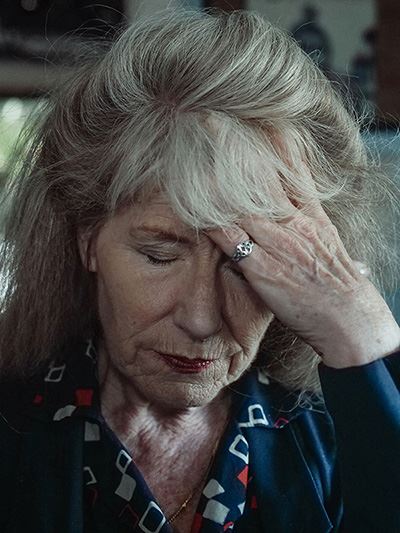Karen Kane McDonnell, PhD, RN, Associate Professor*; Amanda Bennett, MSN, RN, Vera Bratnichenko, MSN, RN, Fattona Umari, BA, BSN, RN, PhD Students; and Ella Weinkle, MSN, RN, Research Associate
Cancer Survivorship Research Center, College of Nursing, University of South Carolina, Columbia, SC 29208, United States
*Corresponding author: Karenkm@mailbox.sc.edu

A lack of management of anxiety and depression are associated with diminished quality of life and increased mortality. Both symptoms are underrecognized and undertreated.1
Integrative oncology is a growing field of cancer care. It is a patient-centered, evidence-based field of supportive cancer care that utilizes integrative therapies such as mind-body practices, acupuncture, massage, music therapy, nutrition, and exercise in collaboration with conventional cancer treatments. Patient interest and utilization has been growing in popularity over several decades. Clinical research has shown the benefits of some of these approaches to improving symptom management and quality of life. The availability of these integrative oncology programs at cancer centers and in communities is also growing, though it is still highly variable from location to location along with program structure and implementation.1
-
A joint effort between the American Society of Clinical Oncology (ASCO) and the Society for Integrative Oncology (SIO) reviewed the evidence and made recommendations about therapies targeting adults with cancer experiencing symptoms of anxiety and/or depression.1,2 The recommendations were developed based on a comprehensive review and analyses of the research literature.2 The literature search from 1990 to 2023 identified 110 relevant studies (30 systematic reviews and 80 randomized control trials).2 Most importantly, these new recommendations can guide clinicians as to which interventions will be most effective in helping their patients.
The following four questions guided the review:
-
1. What integrative therapies are recommended for managing symptoms of anxiety experienced after diagnosis or during active treatment in adults with cancer?
-
2. What integrative therapies are recommended for managing symptoms of anxiety experienced post-treatment in adults with cancer?
-
3. What integrative therapies are recommended for managing symptoms of depression experienced after diagnosis or during active treatment in adults with cancer?
-
4. What integrative therapies are recommended for managing symptoms of depression experienced post-treatment in adults with cancer?2
-
The guideline development process was detailed. An international, multidisciplinary, 18-person expert panel, which included a patient representative, and two doctorly-prepared nurses were responsible for providing critical review and finalizing the guideline. BRIDGE-Wiz software, the GuideLines into Decision Support (GLIDES) methodology, the Cochrane risk-of-bias tool, and the AMSTAR 2 instrument were used to measure the quality of the evidence (rated as High, Intermediate, Low, or Insufficient) and the strength of a recommendation (Strong, Moderate, or Weak).3-5
Twenty-one recommendations regarding therapies are included in the guideline. The following four recommendations were the only ones rated as Strong:
-
1. Mindfulness-based interventions (MBIs) should be offered to people with cancer to improve anxiety during active treatment.
-
2. MBIs should be offered to people with cancer to improve anxiety post-treatment.
-
3. MBIs should be offered to people with cancer to improve depression during active treatment.
-
4. MBIs should be offered to people with cancer to improve depression post-treatment.
Even though the review of MBIs provided the strongest evidence, other types of interventions provided sufficient evidence to inform the recommendations. Those interventions included aroma therapy, acupuncture, expressive writing, hypnosis, music therapy and music-based interventions, reflexology, relaxation techniques, acupuncture, tai chi, qigong, and yoga.2
Other interventions provided inconclusive evidence for informing recommendations, revealing many gaps in the existing evidence base and demonstrating the need for more research. Studies testing acupressure, dance and movement therapy, dietary supplements, healing touch, therapeutic listening, laughter therapy, light therapy, massage, natural products, nutritional interventions, and psilocybin-assisted therapy were included in this category.2

Survivors with cancer use integrative (sometimes referred to as complementary) therapies to help manage side effects and symptoms.
Guideline Implementation
Guidelines are developed for implementation across health-care settings around the world. However, many barriers can slow dissemination. A team approach—in which clinicians partner with expert mindfulness practitioners and translational researchers in their respective settings—may improve the chances of successful implementation.
Due to the evidence base gaps (i.e., not enough studies conducted that could be considered in the review), the expert panel was not able to make recommendations for many supportive care modalities. The panel specifically recommended that more research be conducted with populations other than women with breast cancer, in contexts other than metastatic disease, and among people from diverse backgrounds.
Read the full joint SIO-ASCO Clinical Practice Guideline for Integrative Oncology Care of Anxiety and Depression in Adults with Cancer at either link below:
SIO website: https://integrativeonc.org/practice-guidelines/guidelines
ASCO website:
www.asco.org/survivorship-guidelines
References
-
1. Semeniuk, G., Bahadini, B., Ahn, E., Zain, J., Cheng, J., Govindarajan, A., Rose, J., & Lee, R. T. (2023). Integrative oncology and the clinical care network: Challenges and opportunities. Journal of Clinical Medicine, 12(12), 3946.
https://doi.org/10.3390/jcm12123946
-
2. Carlson, L. E., Ismaila, N., Addington, E. L., Asher, G. N., Atreya, C., Balneaves, L. G., Bradt, J., Fuller-Shavel, N., Goodman, J., Hoffman, C. J., Huston, A., Mehta, A., Paller, C. J., Richardson, K., Seely, D., Siwik, C. J., Temel, J. S., & Rowland, J. H. (2023). Integrative oncology care of symptoms of anxiety and depression in adults with cancer: Society for Integrative Oncology–ASCO Guideline. Journal of Clinical Oncology, 41(28), 4562–4591.
https://doi.org/10.1200/JCO.23.00857
-
3. Shiffman, R. N., Michel, G., Rosenfeld, R. M., & Davidson, C. (2012). Building better guidelines with BRIDGE-Wiz: Development and evaluation of a software assistant to promote clarity, transparency, and implementability. Journal of the American Medical Informatics Association, 19(1), 94–101.
https://doi.org/10.1136/amiajnl-2011-000172
-
4. Higgins, J. P., Altman, D. G., Gøtzsche, P. C., Jüni, P., Moher, D., Oxman, A. D., Savović, J., Schulz, K. F., Weeks, L., & Sterne, J. A. (2011). The Cochrane Collaboration’s tool for assessing risk of bias in randomised trials. BMJ, 343, d5928.
http://doi.org/10.1136/bmj.d5928
-
5. Shea, B. J., Reeves, B. C., Wells, G., Thuku, M., Hamel, C., Moran, J., Moher, D., Tugwell, P., Welch, V., Kristjansson, E., & Henry, D. A. (2017). AMSTAR 2: A critical appraisal tool for systematic reviews that include randomised or non-randomised studies of healthcare interventions, or both. BMJ, 358, j4008.
http://dx.doi.org/10.1136/bmj.j4008
Disclosure: Karen Kane McDonnell is supported by the American Cancer Society under award number MRSG-17-152-01. The content is solely the responsibility of the authors and does not represent the official views of the American Cancer Society.